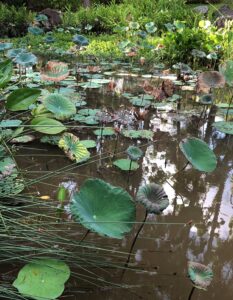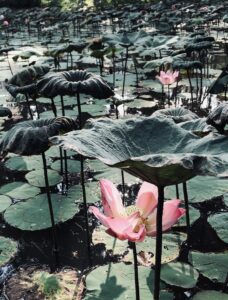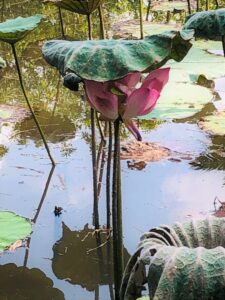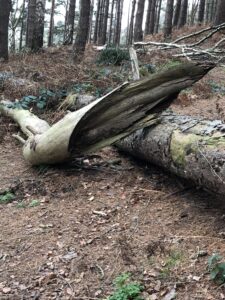“Drop your sense of time temporarily, become like a tree or a rock or a baby, with awareness that has forgotten all sense of time and abides in the peaceful space of the pre-present”
 Dear Integral Meditators,
Dear Integral Meditators,
What if I told you there were four types of present moment, not just one? This weeks article explores four aspects of the present moment, each of which has its own value.
In the spirit of the journey,
Toby
Four Types of Present Moment
Normally when we think or talk about meditating “in the present moment” the assumption is that there is only one type of present moment. Actually, there are many types of present moment experience we can tap into. Here are four. With each one I detail what it is, how it helps us, and how to do a simple meditation upon it.
The Primal Pre-Present
The pre-present is essentially the “present moment” before we had any idea of time. We could also think about it as being the “pre-conceptual present”. Babies are always in the pre-present moment, because their minds have not developed the power of conceptuality, they have no idea of what the past or future is. Their mind remains placed firmly in the here and now, before time existed!
Likewise, animals live in the pre-present because they have non-conceptual minds. Trees and rocks also abide in the pre-present, the time before concepts and before the past and future.
Meditating on the pre-present enables us to relax, return to a state of innocent awareness, and tap into a state of deep regeneration and re-energization.
You can meditate on the pre-present simply by deeply observing a (peaceful) baby, or an animal, or sitting quietly in a landscape. Just drop your sense of time temporarily, become like a tree or a rock or a baby, with awareness that has forgotten all sense of time and abides in the peaceful space of the pre-present.
The Present Moment in Time
This is the type of present moment that we most often think of as the present moment. Our experience that is in the here and now, accompanied by the feeling of there being a past from which we have come, and a future toward which we are going. We cultivate this type of present moment experience by paying close attention to what is going on right now, on the immediate task at hand. Cultivating this form of present moment awareness helps us to be more grounded, to manage stress more effectively, and appreciate all that is good in our life.
You cultivate this form of present moment awareness by spending specific periods of time in our daily routine where trying to do just one thing, and whilst doing it, training our mind to be fully present to the task at hand, not wondering anxiously about the future or re-living the past.
The Timeless Present
The timeless present is the space of awareness beyond time. Once we have become conceptually mature as adults, that is learned to operate within the space of past, present and future, the assumption can be that time is something “out there”. In reality time as we understand it conceptually is an invention of the human mind. To meditate on the eternal present is to recognize that the entire realm of past present and future are all contained within the context of the timeless, and that this eternal, timeless present is always present, right here, right now.
The timeless present in many ways resembles the primal pre-present, but to be able to appreciate and value the timeless present we have to have gone into conceptual time, understood and lived within it, and then see through its illusion. So you could say that the timeless present is the post-transient present!
Meditating on the Timeless Present gives us maturity of vision, depth of perception, a sense of everything possessing its own natural perfection, and opens us up to our first classical “enlightenment experiences”.
We can meditate on the timeless present by recognizing that every aspect of our experience right here right now is contained within the embrace of the timeless present, and learn to relax our awareness into that ever present, eternal space.
The Intuitive Present
The intuitive present is when we have gained substantial experience of the timeless present, and have developed the capacity to function in conventional time whilst at the same time remaining connected to timelessness. As Ajahn-Chah says, it is the meditative experience of our mind being like “still water that moves, and moving water that it still”. From a present moment perspective, it is as if time and eternity now fit together in our experience like a hand in a glove. Conventional time is like the glove, the timeless present is like the hand within.
The intuitive present is not the same as our intuition in general, which can come in many forms such as our instinctive or emotional intuition.
Accessing the intuitive present signals the development of our capacity to engage fully in worldly life and spiritual life side by side, to live in the world whilst not being of the world so to speak. Our experience of the intuitive present gives us a powerful tool to see everything that we experience within the context of our unfolding path to greater awakening.
Article & content © Toby Ouvry 2021, you are welcome to use or share this article, but please cite Toby as the source and include reference to his website www.tobyouvry.com
 Saturday 24th July, 9.30-11.30am – Mindfulness for emotional intelligence masterclass
Saturday 24th July, 9.30-11.30am – Mindfulness for emotional intelligence masterclass
In a sentence: Learn how you can use mindfulness to develop your emotional range and skills
Much of our quality of life depends not so much on what we are experiencing, but the way in which we experience it. Our moods and emotional states to a large degree define the quality of our life experience, at work, in our relationships and in our leisure activities. This masterclass will lead you on an experiential journey
Read full details…
 August 5th, 6th, 7th, 2-4pm – Mindful Life-skills for Teenagers – A three day course
August 5th, 6th, 7th, 2-4pm – Mindful Life-skills for Teenagers – A three day course
These sessions are specifically designed to help teens develop their real inner skills that help them be:
- More effective at achieving their chosen goals
- Build confidence,
- Build resilience around stress and
- Increase their capacity for fun and enjoyment as they learn.
 The new Mindful Self Knowledge coaching program
The new Mindful Self Knowledge coaching program
This is eight-month coaching program with Toby is designed to facilitate your own personal mindful self-discovery process. It focuses on:
- Awareness of how your past experience has influenced who and how you are today
- Confidence in approaching your present experience with playful fullness and enthusiasm
- Giving you the inner tools to face your choices and your future in an empowered, dynamic, and authentic manner
Watch Toby’s video on the Program
 Life-fullness – The Integral Life-Coaching Program with Toby
Life-fullness – The Integral Life-Coaching Program with TobyAre you looking a coach who can help you to:
- Meet the challenges, stress and changes that you face in a more effective and mindful way
- Become happier within yourself, in your relationships and at work
- Be actively accountable for finding a sense of balance/well-being in your life and fulfilling your personal potential?
- Guide you to find and operate from a deeper sense of meaning, motivation and connectivity in your life?
All upcoming classes and workshops at IMA:
Ongoing – Weekly Tuesday, Wednesday Online class schedule
Ongoing on Wednesday’s, 7.30-8.30pm – Wednesday Meditation for stress transformation and positive energy with Toby (Bukit Timah)
Ongoing on Tuesday evenings, 7.30-8.30pm – Tuesday Meditation for stress transformation and positive energy with Toby (East Coast)
Starts 6th&7th July – Integral Meditation from the Perspective of Zen – A 10 week series
Saturday 17th, 24th, 31st July, 2-4pm – Mindful Life-skills for Teenagers – A three week course
Saturday 24th July, 9.30-11.30am – Mindfulness for emotional intelligence masterclass
Integral Meditation Asia
Online Courses * 1:1 Coaching * Books * Live Workshops * Corporate Mindfulness Training *Life-Coaching * Meditation Technology
 Dear Integral Meditators,
Dear Integral Meditators,


 Dear Integral Meditators,
Dear Integral Meditators,







 Audio Serenity
Audio Serenity
